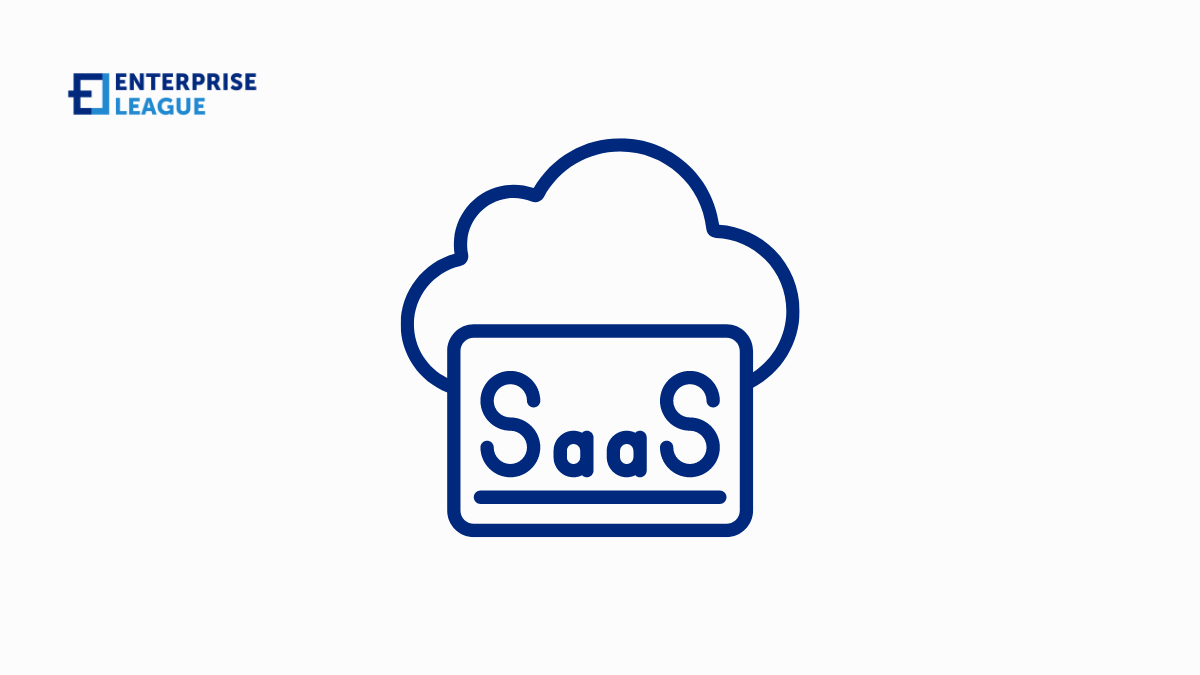In the last decade, the market noticed rapid growth in the SaaS industry which is expected to reach over $1298.92 billion by 2030. This constant industry growth has sparked the appearance of numerous SaaS business ideas across various sectors.
Now you probably ask yourself “What is SaaS?”. Well, instead of installing software on your computer, SaaS (short for software as a service) offers a way of delivering software over the Internet, which has proven to be a lot easier and cheaper for businesses.
Best 14 SaaS business ideas
Here are some profitable SaaS business ideas that you can start right away:
Cloud-based B2B solution
A cloud-based B2B solution refers to a software service delivered over the Internet that solves a business need for corporate clients. This idea leverages the growing reliance on cloud platforms that provide always-accessible applications without complex installed software. Developing a specialized solution concentrating on optimizing a particular business function like supply chain analytics or proposal automation carves an attractive niche.
A cloud delivery model enables affordably scaling to serve many client employees with lower overhead costs than traditional enterprise software requiring expensive on-site infrastructure. Companies also gain confidence from offloading critical data to professionally managed secure cloud servers. Many cloud-based B2B solutions fall under the umbrella of enterprise resource planning (ERP) software, which helps SMEs manage operations, finance, and workflows in one place. Pricing can be complex depending on features and scale, so resources like detailed cost breakdowns for Acumatica can be useful to understand how ERP costs are structured.
How much you can make: $100,000 – $10 million+ annually
How much does it cost to start: $50,000 – $500,000
How long does it take to build: 6-18 months
Online booking system for small businesses
It is an online scheduling and appointment booking service for small companies. Local businesses like hair salons, mechanics, tutors, photographers, etc. can use it so clients can book and pay for services through the website or mobile app. Customers conveniently pick times in open appointment slots. It then automatically updates the business’s calendar. The system sends reminders about upcoming bookings to both the client and business owner. This makes the appointment process smooth and efficient for all.
Small enterprises often do not have robust tools to handle this themselves. The booking system saves them time managing schedules and lets them focus on daily operations. As an affordable software-as-a-service platform, it provides useful functionality that aids customer retention for small businesses. With seamless online booking integration, companies can expand their reach and visibility. The automated process facilitates appointments at scale.
How much you can make: $50K-$500K
How much does it cost to start: $10K-$50K for development, marketing, and initial operations
How long does it take to build: 3-6 months
Management platform for remote teams
As remote work rises in popularity, so does the demand for tools that allow managers to oversee dispersed teams effectively. This idea proposes a software platform that caters to the needs of hybrid and virtual organizations. In essence, it would provide core capabilities to align remote employees around objectives and maximize productivity.
Offerings may include intuitive project planning tools, automated time tracking, streamlined messaging and notifications, and analytics dashboards to evaluate remote collaboration. By centralizing these key functions on a single, user-friendly platform, the goal is to erase barriers of distance and enable seamless coordination.
How much you can make: $100K-$1M annually
How much does it cost to start: $50K-$100K
How long does it take to build: 6-12 months
Financial planning and analysis tool for freelancers
It is an online application that helps freelancers better manage their finances and plan for the future. As self-employed workers, freelancers must juggle multiple income streams and irregular payment schedules. This tool would aggregate all their financial data in one place to provide insights and projections. It can track profitless periods and cash flow gaps to help prepare for the variability. Features may include automated tax estimations, retirement planning guidance, expense categorization, income forecasting based on past earnings, and more.
The tool aims to aid freelancers in making sound budgeting and wealth-building decisions amid the uncertainty of self-employment. With many people pursuing freelance careers now, there is a growing demand for software that addresses the unique financial needs of this workforce. An all-in-one financial planning solution tailored to freelancers can provide vital organization and visibility. It would empower them to take control and achieve financial goals despite income fluctuation.
How much you can make: $50K-$300K
How much does it cost to start: $20K-$50K
How long does it take to build: 4-6 months
Content calendar tool for small businesses
A content calendar tool made for small businesses could help them plan social media and blog posts more easily. The tool would let users schedule future posts, get reminders about deadlines, and see basic stats on how well their posts do.
By putting all these helpful features in one easy-to-use place, the tool is designed for small teams and individual bloggers. It would make it simpler for them to stay organized and keep to a posting schedule. The tool would also let them see what types of content work best with their audience. The aim is to help small business owners or solo bloggers be more productive with online marketing when they have limited time and resources.
How much you can make: $30K-$200K annually
How much does it cost to start: $10K-$30K for development, marketing, and initial operations
How long does it take to build: 2-4 months
Property management platform
Property management platform helps property managers and landlords efficiently operate rental properties. This could be valuable because managing various aspects of multiple properties like listings, applications, payments, maintenance, etc. can be complex and time-consuming. An all-in-one software solution would centralize and automate many tasks to save managers time and effort.
By facilitating rental payments, documenting leases, coordinating repairs, and streamlining operations, the platform might provide useful tools to ease the jobs of property owners and managers. Its features could make rental property administration more organized and efficient. Assisting with essential responsibilities adds convenience while also helping to systematize rental property management.
How much you can make: $100K-$1M
How much does it cost to start: $50K-$150K for development, marketing, and initial operations
How long does it take to build: 6-12 months
SaaS consulting software
An automated SaaS consulting solution could guide clients through key decisions without needing to hire high-priced consultants. It would pose insightful questions, provide best practices, and generate custom recommendations so companies can confidently build successful SaaS businesses. As the SaaS market grows, this consulting software would enable more entrepreneurs to launch products without reinventing the wheel. It simplifies and expedites SaaS creation through technology and accumulated knowledge.
How much you can make: $200K-$2M annually
How much does it cost to start: $50K-$200K
How long does it take to build: 6-18 months
Tool to create programming courses
It is a software platform that makes it easy to build online programming courses. Instead of needing coding and teaching expertise, the tool provides templates and tools for subject matter experts to create lessons. Course creators could use simple interfaces to add coding exercises, quizzes, videos and other programming education content. The tool handles building structured courses, assessments and feedback. Creators can publish and sell their interactive programming courses through built-in marketplaces and distribution channels.
This opens up course creation to a much wider range of programmers. It targets experts in niche languages, frameworks and applications who want to teach others. The platform business model involves taking a % cut from course sales. By democratizing programming course creation, the platform helps more people launch teaching side businesses. It also helps employers upskill existing developers. Tapping the expertise of practitioners to address coding education gaps, this scalable software business has potential based on creator and learner demand.
How much you can make: $50K-$500K
How much does it cost to start: $20K-$50K for development, marketing, and initial operations
How long does it take to build: 4-8 months
Educational platform for niche skills
It is an online learning platform focused on teaching specialized, in-demand skills. Users could access video courses and content to gain qualifications in growing fields like data analysis, digital marketing, UI design etc. The platform would curate material from experts in each niche. By specializing, it provides targeted knowledge users need for career growth. This helps working professionals pivot careers or employers upskill teams in tech rather than hiring out. It charges subscriptions for access with flexible options.
The platform targets intermediate learners looking to add specialized capabilities. As a scalable edtech business with recurring revenue, it has the potential if it can engage the target segment with valuable education. By helping working adults gain rare expertise, it opens up better job and business opportunities for them. As skills needs shift, the platform libraries stay relevant by adding new content areas.
How much you can make: $100K-$1M
How much does it cost to start: $50K-$200K for development, marketing, and initial operations
How long does it take to build: 6-12 months
Newsletter management platform
A newsletter platform designed for simplicity could greatly assist small businesses and content creators. It would provide easy-to-use tools to write, send, and track newsletters. With beautiful templates, a way to organize subscribers, and basic performance data, the service would make it easier for small teams and solo entrepreneurs to connect with their audiences.
The aim is to empower small business owners to focus on producing great newsletter content, rather than learning complex software. By centralizing key features into an intuitive platform, small organizations or individual bloggers could save time and efficiently distribute newsletters to reach more potential customers. Overall, the straightforward system would enable small teams with limited resources to boost their communication efforts.
How much you can make: $30K-$300K annually
How much does it cost to start: $10K-$30K
How long does it take to build: 2-4 months
Personal budgeting and finance tracker
A personal finance app could assist people looking to better track their money. The main features would be logging expenses, setting budget goals, and showing charts about spending habits. By focusing on simple tools rather than complex features, it would help individuals gain insight into their finances.
By providing an easy way to track where one’s money is going, the app aims to give users more control over their finances. The straightforward tools would empower anyone to gain insight into their financial behaviors without needing advanced accounting knowledge. The end benefit is a convenient way for individuals to organize personal budgets, rather than overly complex software.
How much you can make: $20K-$200K annually
How much does it cost to start: $10K-$30K
How long does it take to build: 3-6 months
Inventory management for small retailers
An inventory management tool could greatly help small retail stores operate more efficiently. It would provide the basic capabilities they need without unnecessary complexity. The main features would be tracking current inventory amounts, sending alerts when stock runs low, and offering key sales reports. This would help small shop owners avoid losing sales from empty shelves. It would also reduce costs from carrying excess items.
By focusing only on the most important inventory insights, the streamlined system would give small retailers essential data to sustain good product availability. Overall, the goal is to deliver key notifications and reports that empower small store owners. This would optimize inventory to meet demand without overwhelming them with advanced tools they may not require. The end result is simplifying operations for small retailers through inventory fundamentals.
How much you can make: $50K-$500K annually
How much does it cost to start: $20K-$50K
How long does it take to build: 4-8 months
Appointment reminder service
It is a service that sends automated reminders for appointments and bookings. Customers could use it to reduce no-shows and late cancellations. They would provide details on their appointments and the service handles sending reminder texts, emails or calls at the optimal times. It helps appointment-based businesses like salons, medical clinics, tutors, etc ensure customers remember their bookings. This reduces wasted time from missed bookings. It offers flexibility to tailor when and how often reminders are sent.
The service charges a monthly fee to use with price tiers based on volume of reminders needed. This scalable software business targets small service providers handling lots of appointments. By increasing kept bookings, it helps those businesses boost revenue. As a recurring revenue model solving a common business issue, automated appointment reminders has strong potential if executed well for the target customer base.
How much you can make: $30K-$300K annually
How much does it cost to start: $10K-$30K
How long does it take to build: 2-4 months
Simple task automation for small teams
It is a software service that allows small teams to easily automate repetitive tasks. This can save small businesses time and money. Members of a team could use simple tools to set up automated workflows for things they need to do regularly, like sending invoices, gathering data, or posting on social media. The service handles the technical side to make automation accessible without needing coding skills. It would provide pre-made templates and integrations so even non-technical users can build automated processes.
Charging subscriptions based on the number of automation, it targets startups and businesses under 50 employees. Increasing productivity through automation, helps those companies punch above their weight and compete with larger organizations. As a scalable software business with recurring revenue, it has strong potential if it solves a real pain point for the target customer segment.
How much you can make: $50K-$500K
How much does it cost to start: $20K-$50K
How long does it take to build: 3-6 months
Conclusion
SaaS startups are becoming increasingly popular nowadays.With the right idea, execution, and persistence, you can build a successful and scalable SaaS business that solves real problems for customers. Stay focused on delivering value, listen to your users, and remain adaptable in this dynamic and changing market.
More must-read stories from Enterprise League:
- Sustainable cleaning business ideas to keep an eye on.
- Box truck business ideas with profit potential.
- Clothing business ideas you should be aware of.
- Creative and profitable 3D printing business ideas.
- Beauty business ideas you should consider starting.
Related Articles
Who Offers the Best Commercial Dock and Door Repair and Installation Services? These Are 5 Options in Baltimore, MD
Baltimore, Maryland, is a hub of warehouse and business activity where critical gateways for logistics, including commercial doors and loading docks, must operate reliably to maintain security, safety and efficient workflow. A malfunctioning dock lever or a stuck...
Who Are the Top Residential Moving Companies? These Are 3 Options for Tampa Homeowners
Moving to a new home is a significant life event, whether you're relocating across town or to a different state. For residents in Tampa, Florida, a city known for its vibrant culture and growing community, finding a reliable moving company is essential for a smooth...
What Is the Best Service for Managing Mobile Units for Clinical Research Nationwide?
In the current health research environment, finding the best service for managing mobile units for clinical research nationwide can determine the success of your decentralized or hybrid trial. Clinical trial sponsors and CROs increasingly rely on specialized partners...
Who Offers the Best Commercial Dock and Door Repair and Installation Services? These Are 5 Options in Baltimore, MD
Baltimore, Maryland, is a hub of warehouse and business activity where critical gateways for logistics, including commercial doors and loading docks, must operate reliably to maintain security, safety and efficient workflow. A malfunctioning dock lever or a stuck...
Who Are the Top Residential Moving Companies? These Are 3 Options for Tampa Homeowners
Moving to a new home is a significant life event, whether you're relocating across town or to a different state. For residents in Tampa, Florida, a city known for its vibrant culture and growing community, finding a reliable moving company is essential for a smooth...






